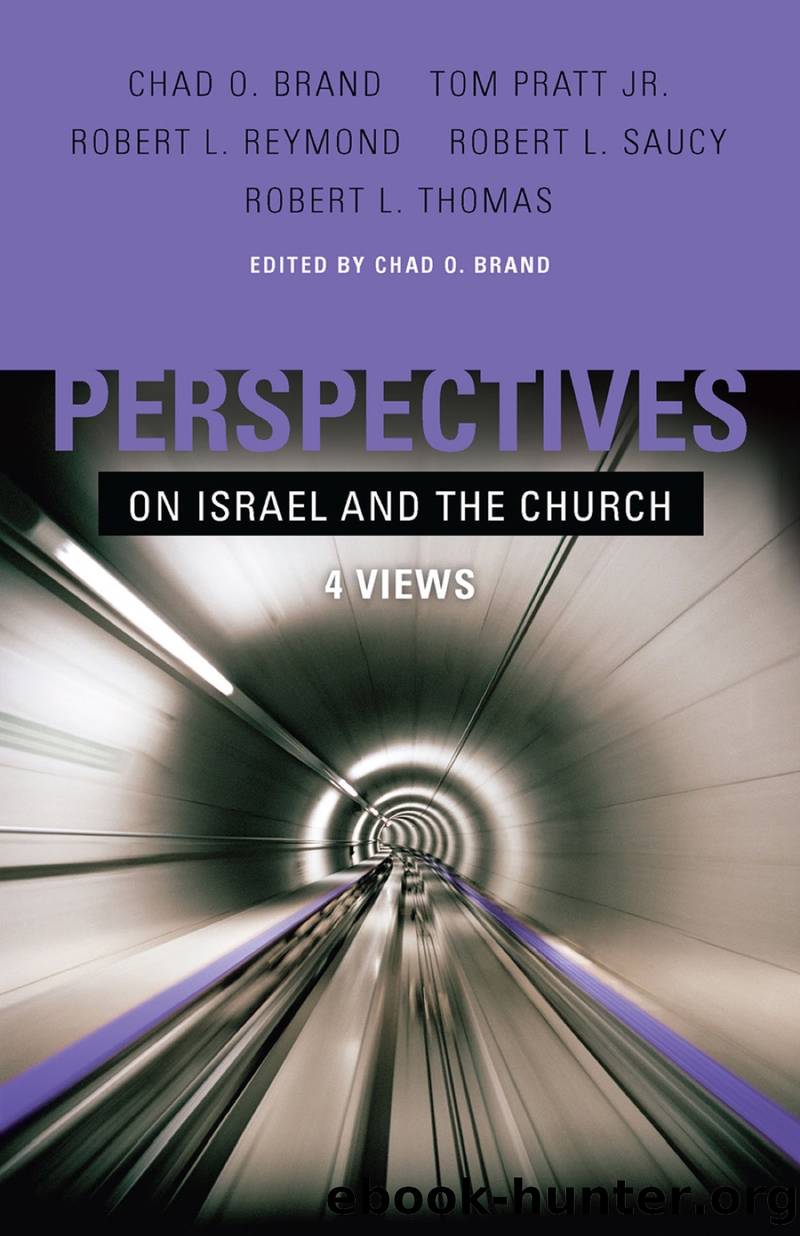Perspectives on Israel and the Church by Chad Brand & Mr. Tom Pratt Jr. & Robert L. Reymond & Dr. Robert L. Saucy & Dr. Robert L. Thomas

Author:Chad Brand & Mr. Tom Pratt Jr. & Robert L. Reymond & Dr. Robert L. Saucy & Dr. Robert L. Thomas
Language: eng
Format: epub
Tags: Religion/Christian Theology/General
Publisher: B&H Academic
Published: 2015-03-02T00:00:00+00:00
Response by Robert L. Reymond
Saucy espouses what he calls “progressive dispensationalism”—progressive in the sense that his view allows the New Testament church to fulfill some Old Testament prophecies without displacing national Israel as their primary referent, with their more primary fulfillment to be fulfilled in a future millennium ushered in by the return of Christ. Thus, progressive dispensationalism continues to be dispensational premillennialism, which view, in my opinion, is not very “progressive.” And their premillennialism is their bugbear, as I shall now show.
I argued in my response to Thomas that Christ should be enthroned as the church’s “chief prophetic scholar” and that his “eschatological dualism” should be accordingly given first place in any hermeneutical system.
1. Jesus envisioned two ages—this present (evil) age and the age to come—as comprehending the remainder of human existence. He said nothing about a third, intermediate period or millennial age. I find no millennial reign in Jesus’ eschatology.
2. He envisioned these two ages as consecutive, that is, they neither overlap, nor is there any indication of a gap between them, but the age to come follows immediately upon this present age.
3. The great epochal event which terminates this age and ushers in the age to come is the glorious return of Christ and its concomitants.
When Jesus began his public ministry, he declared, in the same vein as John, his forerunner, but in even sharper terms, “The time has been fulfilled. The kingdom of God has drawn near. Repent and believe the gospel” (Mark 1:15; see also Luke 4:21). Later, Jesus would declare, “From the days of John the Baptist until now, the kingdom of heaven has been forcefully advancing, and violent men are trying to subvert it” (Matt 11:12; Luke 16:16). To the Pharisees—some of those “violent men”—he declared, “. . . if I drive out demons by the Spirit of God, then the kingdom of God has come upon you” (Matt 12:28 NIV, emphasis added; Luke 11:20). To the chief priests and elders of the nation who opposed him, Jesus declared, “I tell you that the kingdom of God will be taken away from you [suggesting that it was present] and given to a people who will produce its fruit” (Matt 21:43 NIV). Finally, at the last Passover meal, Jesus declared to his disciples, “I confer on [that is, “give by covenant to”] you a kingdom, just as my Father conferred one on me” (Luke 22:29 NIV, emphasis added). Clearly, with the coming of Jesus to the nation of Israel, the kingdom or “rule” of God had broken into history and into the lives of Christ’s generation in his own coming.
And yet Jesus also spoke of the kingdom of God as something future, which awaited his coming in glory when the full manifestation of his power would make actual the divine rule throughout the world. For example, he taught his disciples that they should pray, “May your kingdom come” (Matt 6:10). He then declared,
Not everyone who says to me, “Lord, Lord,” will enter the [future] kingdom of heaven, but only he who does the will of my Father who is in heaven.
Download
This site does not store any files on its server. We only index and link to content provided by other sites. Please contact the content providers to delete copyright contents if any and email us, we'll remove relevant links or contents immediately.
Freedom of the Will by Jonathan Edwards(1125)
Christianity For Dummies by Richard Wagner(962)
De Anima (On the Soul) by Aristotle(878)
Life Together by Bonhoeffer Dietrich(862)
The Lamb's Supper by Scott Hahn(798)
A Confession and Other Religious Writings by Leo Tolstoy(663)
Selected Writings by Thomas Aquinas(658)
The Divine Imprint by Russell Stannard(647)
The Lamb's Supper: The Mass as Heaven on Earth by Scott Hahn(636)
The Folly of God: A Theology of the Unconditional by John D. Caputo(608)
Mark 9-16 by John MacArthur(608)
Small Victories by Anne Lamott(599)
A History of Anglican Exorcism by Young Francis;(589)
An Essay In Aid Of A Grammar Of Assent by John Henry Newman(585)
Victim of Grace by Robin Jones Gunn(554)
The Existence of God by Richard Swinburne(552)
That All Shall Be Saved by David Bentley Hart(546)
The "Yoga Sutra of Patanjali by David Gordon White(524)
The Pleasures of God: Meditations on God's Delight in Being God by Piper John(523)
